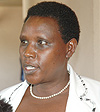GASABO - The Minister of Education, Dr. Daphrose Gahakwa, yesterday opened the 6th International seminar on curricula development.


GASABO - The Minister of Education, Dr. Daphrose Gahakwa, yesterday opened the 6th International seminar on curricula development.
The five-day seminar being held at La Pallise Hotel, Nyandungu is organised by the United Nations Educational, Scientific and Cultural Organisation (UNESCO)’s International Bureau of Education (IBE), the German Technical Cooperation (GTZ) and the Ministry of Education.
Under the theme; "Curriculum Innovation for Learning to live Together: Integrating peace and poverty alleviation,” brought together 15 African countries.
"Rwanda is committed to achieving the education sector targets set out in its development programmes and those set out by the United Nations through the Millennium Development Goals,” said Gahakwa.
She added that the government considers education "a fundamental right” for the citizens and has adopted several policies such as science and information technology policy, unity and reconciliation, to help the sector.
She, however, said that the government was now faced with the challenge of keeping pupils who enrol at primary level from dropping out.
"We have a 96 percent enrolment at primary level but this commendable effort is not helped by a 13 percent drop-out rate and just fewer than 10 percent repetition in classes,” she said.
She added that of all the pupils who enrol for Primary school, only 59 percent manage to make it to Secondary school level.
Commenting on the relevance of the seminar to Rwanda, Gahakwa said that the education ministry will ensure that national programmes of unity and reconciliation are disseminated early enough in primary schools.
Clementina Acedo, the Director of UNESCO-IBE, said the seminar was crucial because access to education does not necessarily mean access to knowledge.
The minister pointed out that some of the invited countries at the seminar have a history of conflict and that the relationship between conflict and education cannot be ignored.
Ends


